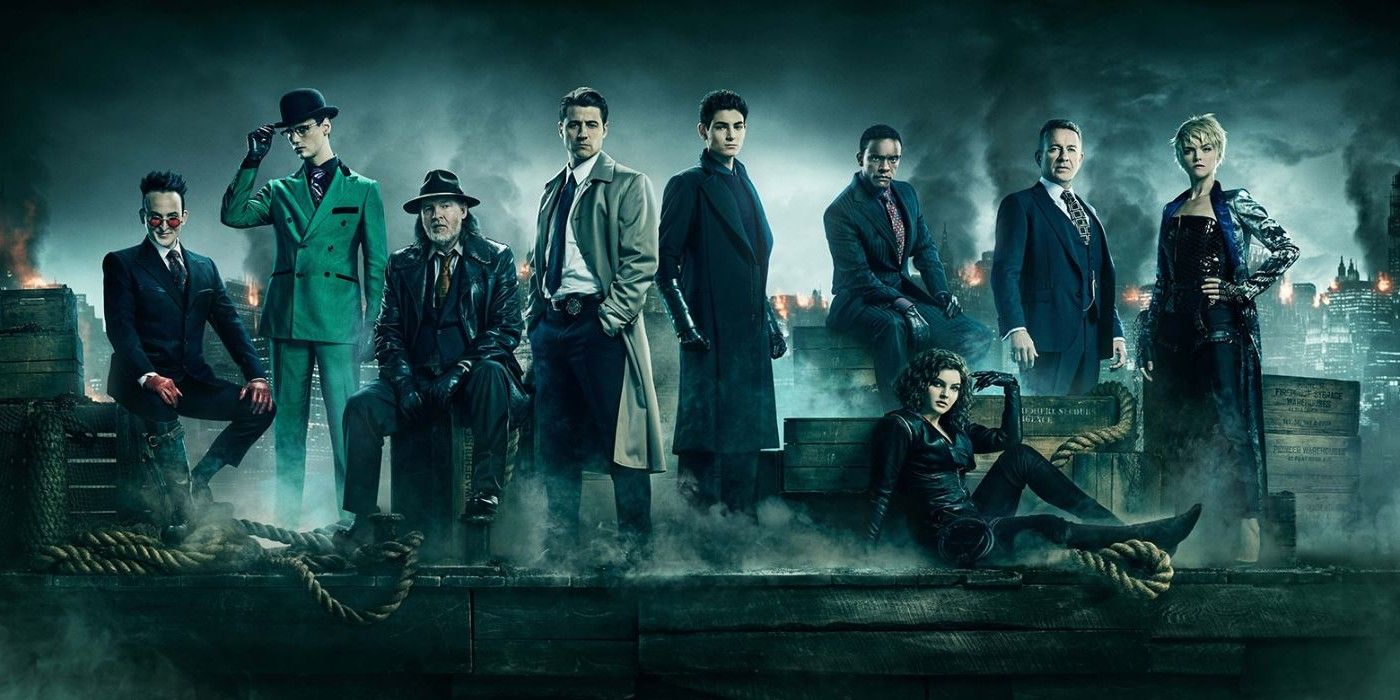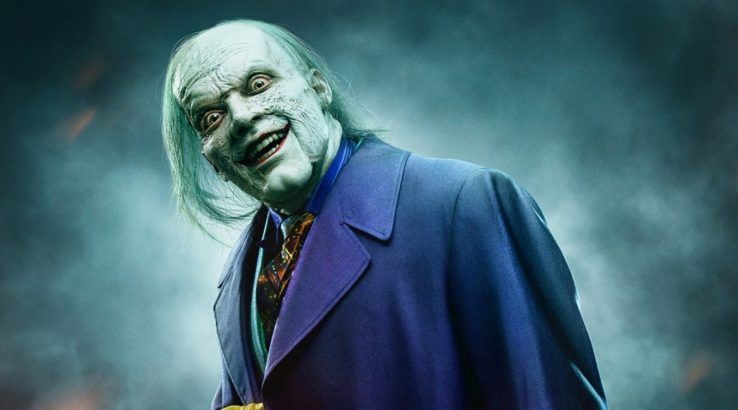Gotham started with the murder of Thomas and Martha Wayne, and ended with Batman watching over Gotham. The show told revamped origin stories for its whole cast from Batman himself, to popular villains like Penguin, The Riddler, and Scarecrow. It started off small, with Gordon taking on the corrupt police department and the mob, escalating until the final season, in which Gotham is cut off from the US and everyone has to fend for themselves (like in Dark Knight Rises, or the comic story line No Man's Land).
Gotham was a beautifully weird show, often owing its tone to the Tim Burton era of Batman movies. At its best the show was filled with a manic energy and gothic design. In one episode a young Bruce Wayne fights one of the show's Joker stand-ins within a carnival's house of mirrors. Later in the show Leslie Thompkins runs her own "court" in the narrows (Gotham's slums), and Penguin's night club is as important to the show as the police precinct. This was a show which gave up the more grounded takes on the franchise favoured by the likes of Christopher Nolan, choosing instead to be just bonkers. Yes, there were procedural crime elements, and crime drama like episodes, but there was also a cloning facility which brought people back to life on the order's of The Court of Owls (basically the Batman version of the illuminati). There was even a few episodes where the Penguin's character arc basically turned into Cinderella, with Penguin becoming Gotham's version of Cinderella, being forced to play the servant by his "wicked" step family. All of the sources that Gotham's writers could have drawn from when plotting out their seasons, the fact that they chose a fairy tale like Cinderella of all things is a great example of this show's creative energy. What's even better is that it was still one of the less bizarre plot lines the show had to offer. The Riddler alone was frozen alive, killed, brought back, and mind controlled.
The best thing about Gotham was the confidence the creative team had in telling the stories they wanted to tell. One of the issues which plagued Smallville, another superhero origin story, was that the writers never seemed sure how much of Superman's backstory they were allowed to go into. In one episode Clark Kent puts on his famous glasses, and the scene is shot like it's a big deal, only for subsequent episodes to completely ignore it, as if the writers weren't sure whether or not the show was going at the right pace. Gotham did not suffer from this problem. The writer's wanted Batman to attempt to work as a vigilante in his youth during Season 4, so that's what happened. They wanted The Riddler to pick Lucius Fox as his adversary, so that's what happened. Issues over whether or not the Joker could be included aside, the show didn't feel like it was being held back from becoming the show that the people behind the scenes wanted to be. Gotham wasn't made to fit to what the canon of the comics was, it was written to be a show which made sense for its version of the characters. When The Penguin fell in love with The Riddler it didn't matter than it hadn't happened in the comics, it felt like a natural progression for Gotham's Penguin, and that's what matters.
Gotham had a lot of characters to work with, and it was great at juggling them. Equal time was given to James Gordon, his friends/colleagues, the various villains, and the young Bruce Wayne. It wasn't always successful, and by the end the writers clearly didn't know what to do with mob boss, Fish Mooney, but for the most part each element of the show was given the time it needed; Gotham wasn't just an origin story for Batman, or for James Gordon, it was an origin story for the fictional city of Gotham, and all of its most famous and infamous faces. It doesn't feel like a coincidence that the showrunners named Gotham after the city rather than any one of the characters. By the time the series drew to a close the creators managed to make their version of Gotham feel like it had its own people and identity. It felt like its own place with its own problems, rather than a setting which was just killing time until Batman showed up. Episodes like the one which showed the origin of the Red Hood gave the show its own urban legends and sense of mythology. At the end of the show, when the biologically augmented super solider backed by the daughter of an immortal assassin threaten the city, all the characters band together to stop them, showing how much of a community had been built up over the previous 90+ episodes.
There seemed to be a time when superhero movies seemed to be almost ashamed of being about superheroes. They had to be grounded in reality, and popular super hero staples like colourful costumes were either ignored or made fun of. Gotham went against this trend completely. Everything that could be found in the Batman comics; gangsters, supervillains, ninjas, magic, and mad scientists were all blended together in one big beautiful mess of a show. Gotham showed that it was possible to be dark without being grim. That a superhero show could balance the silly with the serious. It's biggest contribution to superhero media was to take a look at the debate over whether it should be fantastical or character debate and say that shows/movies like Gotham can be both. Hopefully that will be the show's legacy years from now.


